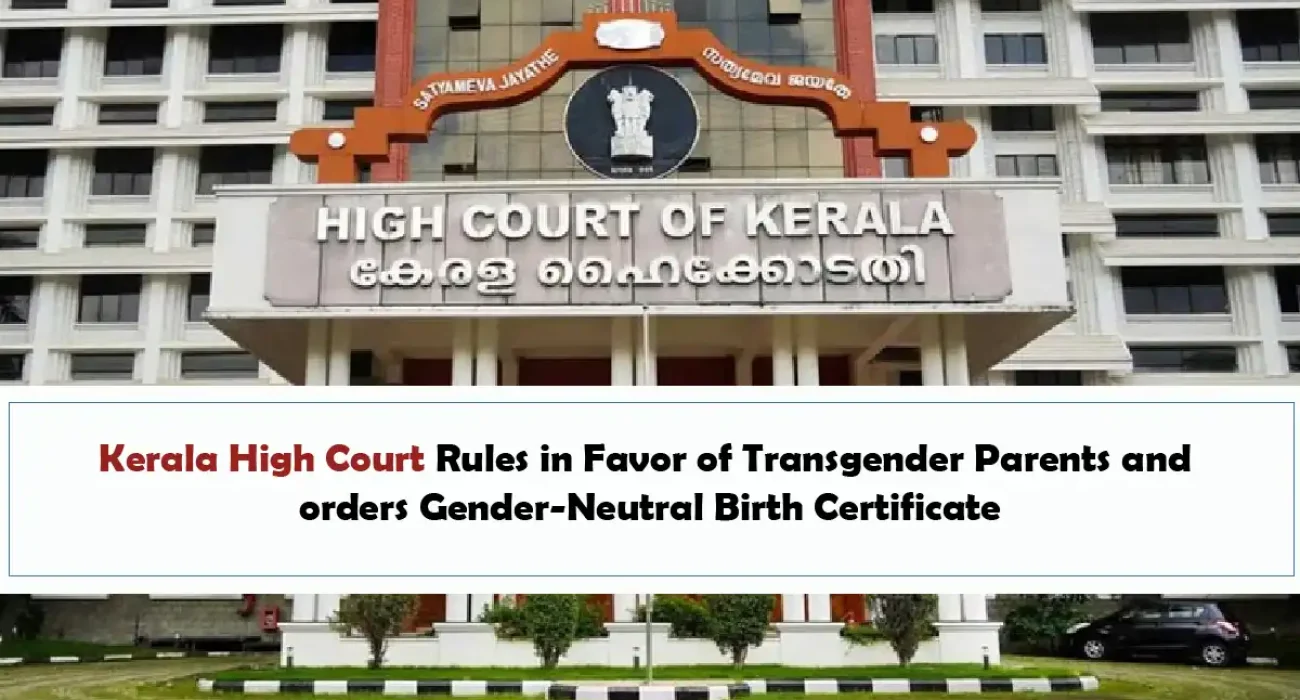

Table of Contents
ToggleThe petition was filed by Zahhad and Ziya Paval, a transgender couple recognized as India’s first transgender parents. Zahhad, a trans man, had carried and given birth to their child, while Ziya, a trans woman, is his partner. When the birth certificate of their child was issued by the Kozhikode Corporation, Zahhad was listed as the “mother” and Ziya as the “father”, contrary to their self-identified gender identities. They sought rectification in the birth certificate to replace the terms “father” and “mother” with the gender-neutral term “parents”.
Prior to filing the writ petition, the couple had approached the Kozhikode Corporation with the request to change the parental designations. However, the corporation rejected it on the grounds that the Registration of Births and Deaths Rules, 1999, under the Registration of Births and Deaths Act, 1969, mandated a binary parental classification of “father” and “mother.”
The petitioners argued that the gender-specific descriptors used in the birth certificate were inconsistent with their legally and socially recognized gender identities. This misrepresentation, they contended, could cause significant confusion, stigma, and prejudice for their child in the future, particularly in areas like education and employment.
They invoked the Transgender Persons (Protection of Rights) Act, 2019, emphasizing their right to recognition, dignity, and non-discrimination, and urged the Court to adopt an interpretation of the law that aligns with evolving societal norms and judicial recognition of gender diversity.
The Kozhikode Corporation and other respondents defended their position by relying strictly on existing legal provisions, particularly the Registration of Births and Deaths Act, 1969 and the 1999 Rules, which mandate the inclusion of “mother” and “father” in birth certificates. They asserted that there was no legal provision permitting the designation of “parents” in place of the traditional binary.
Furthermore, they argued that since the child (3rd petitioner) was not a transgender person, the rights under the Transgender Persons Act would not directly apply to him.
Justice Ziyad Rahman A.A. adopted a “social context adjudication” approach over a strictly adversarial one, grounding the judgment in evolving constitutional jurisprudence on equality and dignity. The Court referenced several landmark Supreme Court rulings, “The law cannot remain static, but it has to evolve in accordance with the changes in the society and the lifestyle of members of the society.”
Relying on National Legal Services Authority v. Union of India (2014) and the Transgender Persons Act, the Court observed that transgender individuals are entitled to constitutional protection under Articles 14, 15, 16, 19, and 21, which are gender neutral.
Citing Deepika Singh v. CAT (2023) and Badshah v. Urmila Badshah Godse (2014), the Court emphasized the need to redefine family structures and interpret laws with “a purpose that bridges the gap between the law and society.” “The black letter of the law must not be relied upon to disadvantage families which are different from traditional ones.”
The Court stressed that while the birth register entries (legal record) would remain unchanged, the certificate issued under Section 12 of the Act only needs to include “extracts”, not all recorded data. “If a certificate sought by the petitioners advances the welfare, interests, and rights of the petitioners… particularly when their rights originate from the Articles of the Constitution… the court need not hesitate to step in.”
The Court rejected the idea of reading down the Rules, holding that the present case was “a rare and exceptional one”, but left the door open for broader reform.
The Kerala High Court allowed the petition and directed the Registrar of Births and Deaths (5th respondent) to issue a birth certificate in Form 5, modified by removing the gendered columns of “father” and “mother” and instead listing Zahhad and Ziya as “parents”.
The modification applies only to the birth certificate. No changes are required in the official birth register.
The certificate must be issued within two months from the date of the judgment.
The HC concluded by stating that “Law has to be dynamic and ought to evolve to tackle such issues. One cannot be hyper-technical while dealing with personal issues with hardly any public law element involved.”
Credits: Adv. Deeksha Rai
IAW resources
Browse our help directory